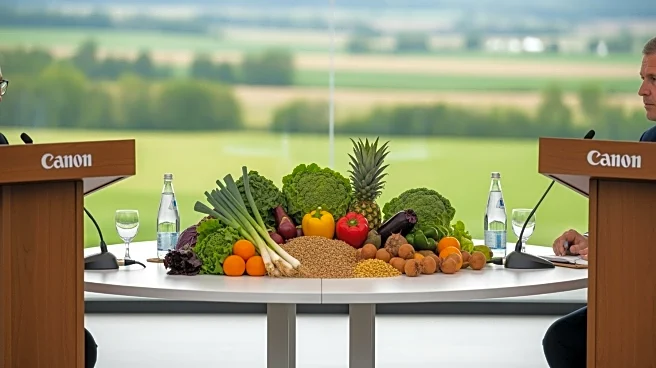What's Happening?
On October 15, 2025, the Director-General of the Food and Agriculture Organization (FAO) held a bilateral meeting with Her Excellency Halla Tómasdóttir, President of Iceland, in Reykjavik. The meeting focused
on Iceland's goals for sustainability, particularly the role of food systems in advancing global sustainability. The Director-General highlighted FAO's Strategic Framework 2022-31, which aims to transform global agrifood systems sustainably. He also mentioned the establishment of FAO Youth and Women’s Committees and the Office of Youth and Women. President Tómasdóttir expressed concern for global challenges faced by women and girls, recognizing their potential as agents of change. The meeting also covered Iceland's pioneering role in ocean governance and its expertise in regulating fisheries and marine resources. The Director-General briefed the President on the FAO World Food Forum, a platform engaging youth, scientists, investors, and policymakers in shaping the future of agrifood systems.
Why It's Important?
The meeting underscores the importance of international collaboration in addressing global sustainability challenges, particularly in agrifood systems. Iceland's expertise in marine innovation and renewable energy positions it as a key player in advancing sustainable practices. The focus on gender-inclusive development highlights the role of women and girls as crucial agents of change in achieving sustainability goals. The FAO's initiatives, such as the World Food Forum, aim to accelerate the transformation of agrifood systems by engaging diverse stakeholders. This collaboration could lead to innovative solutions and policies that address food security, environmental sustainability, and gender equality on a global scale.
What's Next?
The meeting concluded with a shared commitment to continue advancing sustainable agrifood systems, leveraging Iceland's strengths in marine innovation, renewable energy, and gender-inclusive development. Future collaborations may focus on implementing innovative solutions observed during field visits in Iceland. The FAO's upcoming 80th anniversary and the World Food Forum provide opportunities for further engagement and policy development. Stakeholders, including youth, scientists, and policymakers, are expected to play a significant role in shaping the future of agrifood systems and accelerating their transformation.
Beyond the Headlines
The emphasis on gender-inclusive development and the role of women and girls in sustainability efforts highlights broader social implications. Iceland's focus on marine innovation and renewable energy could serve as a model for other countries seeking to balance economic growth with environmental stewardship. The FAO's initiatives may inspire similar efforts globally, fostering a collaborative approach to addressing food security and sustainability challenges. The meeting reflects a growing recognition of the interconnectedness of social, environmental, and economic factors in achieving global sustainability goals.









